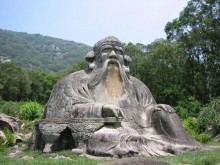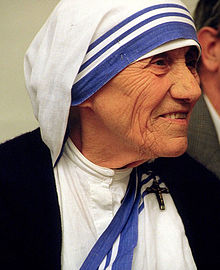Compassion

Lao Tzu
Courtesy of Art Energy
We left the previous post with (my interpretation of) Jon Kabat-Sinn’s charged view of meditation:
Meditation requires that we open ourselves, letting go of our lives. Like a warrior, we should be on guard to act upon the signs presented to each of us, swiftly and decisively.
Which would imply a profound act of trust, requiring that we trust our lives to the compassion of the oneness of the universe.
These statements need clarification.
The salient feature of this Taoist Oneness is that one is all, and all is one. Or, that each individual is a protruding form of one diverse, specialized, and interconnected intelligent organism. According to the Tao Te Ching scriptures, meditation is the way to tap into this universal intelligence.
Taoism and Buddhism also express that we should unfold our lives in the present, in a state of awareness or being, not regretting the past nor worrying about the future. Naturally, this passive and detached attitude leads to a lack of participation in society, which was one of the reasons that led Confucianists to criticize Buddhist monks in China.
It’s obvious that there are rewards from resting our needlessly constantly busy minds, which otherwise usually leads to confusion of the heart. It’s also easy to understand why we would follow nature’s beauty and rhythm.
Quantum physics, and in particular Quantum entanglement, has heightened the misconception that science can explain the universe’s intelligence or interconnection of consciousness. It doesn’t.

Mother Teresa of Calcutta
Courtesy of Wikipedia
On the other hand, it’s heartening to find compassion to be a recurring and fundamental theme in all developed religions, and what’s better, science shows that serving others makes us happy. In other words, our bodies generate oxytocin in the presence of a needy human being, and we are rewarded with a rush of dopamine after doing the right thing.
Furthermore, those who are genetically gifted with an oxytocin lavish generating vagus nerve system, or have a larger propensity to be generous, are recognized (in a Gladwellian way) in less than 20 seconds by their peers, reaping the benefits derived from the enhanced trust of the members of his larger network.
If you consider the natural empathy endowment of our mirror neurons, you may realize the multiplying effect of one act of compassion rippling itself through our network’s members as waves in a pond. Watch this video to appreciate the wonderful effect of validation.
So, I can’t talk about an intelligent universe, but, I can safely say that compassion has an enormous power to bring happiness. It has been known by the sage for millennia, and current science confirms it.
I’ll leave you with this thought from Einstein:
A human being is a part of the whole called by us universe, a part limited in time and space. He experiences himself, his thoughts and feeling as something separated from the rest, a kind of optical delusion of his consciousness. This delusion is a kind of prison for us, restricting us to our personal desires and to affection for a few persons nearest to us. Our task must be to free ourselves from this prison by widening our circle of compassion to embrace all living creatures and the whole of nature in its beauty.
And, these few select others:
He who does not trust enough will not be trusted. ~Lao Tzu
The greatest good you can do for another is not just to share your riches but to reveal to him his own. ~Benjamin Disraeli
Those who bring sunshine to the lives of others cannot keep it from themselves. ~James Matthew Barrie
Make it a practice to judge persons and things in the most favorable light at all times and under all circumstances. ~Saint Vincent de Paul
The kindest word in all the world is the unkind word, unsaid. ~Author Unknown
Kindness is the language which the deaf can hear and the blind can see. ~Mark Twain
Don’t wait for people to be friendly, show them how. ~Author Unknown
Today I bent the truth to be kind, and I have no regret, for I am far surer of what is kind than I am of what is true. ~Robert Brault
Don’t be yourself – be someone a little nicer. ~Mignon McLaughlin, The Second Neurotic’s Notebook, 1966
